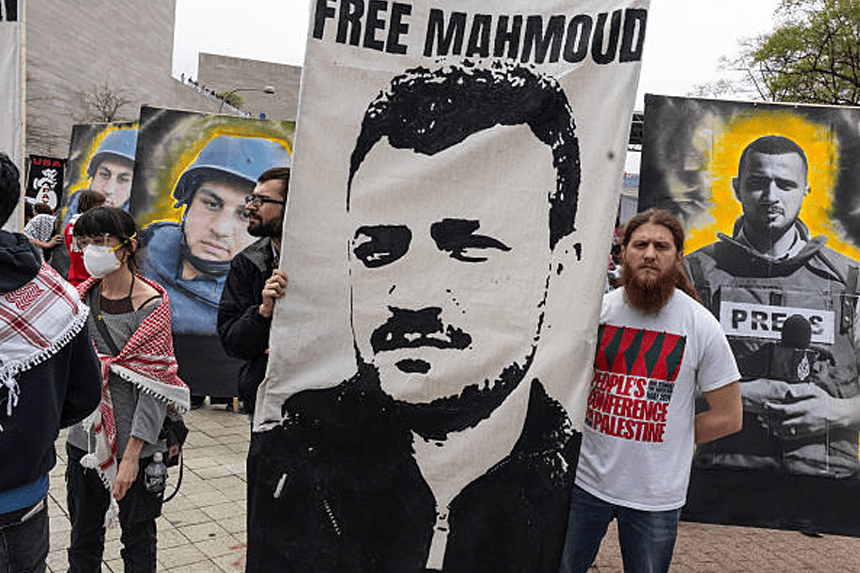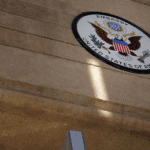A recent Khalil court ruling has halted the deportation and detention of Columbia University activist Mahmoud Khalil, drawing national attention. The federal judge found no compelling reason to imprison or remove Khalil, a lawful permanent resident. His arrest during a protest crackdown sparked widespread criticism and legal action. Now, this ruling is seen as a significant win for due process and constitutional rights. As the government considers an appeal, Khalil’s case continues to shape the broader debate over free speech and immigration policy in the United States.
- Why Did the Judge Block Mahmoud Khalil’s Deportation?
- What Led to Mahmoud Khalil’s Arrest?
- How did the Court support its ruling?
- What Has Been the Public Reaction?
- For what reason is this case a legal turning point?
- How Could the Khalil Ruling Shape Future Immigration and Free Speech Battles?
- Conclusion: What Does the Ruling Mean for American Justice?
Why Did the Judge Block Mahmoud Khalil’s Deportation?
A federal judge has given a significant order that halts the deportation and ongoing incarceration of Mahmoud Khalil, a Columbia University activist who was arrested by immigration agents in March. The court decision, which came after weeks of legal arguments and mounting public interest, underscores the limits of executive power in immigration enforcement.
The Khalil court ruling is being hailed as a key moment in the judicial fight against the Trump administration’s recent drive against foreign nationals engaging in U.S. university protests. Judge Michael Farbiarz ruled that there was no compelling basis to either deport or continue detaining Khalil, a valid permanent resident who has not been charged with any crime.
What Led to Mahmoud Khalil’s Arrest?
Khalil was taken into custody at his home in New York as part of a broader immigration sweep targeting international students and legal residents who participated in demonstrations linked to the Israel-Gaza conflict. He has now been kept at a detention center in Louisiana, far from his family and legal team.
The arrest sparked widespread condemnation and mobilized civil rights advocates, many of whom viewed it as a politically motivated response to campus activism. Advocates cited Khalil’s clean record, academic status, and recent infant birth as grounds for instant release.
How did the Court support its ruling?
In his written ruling, Judge Farbiarz emphasized that Khalil’s ongoing incarceration and eventual deportation served no urgent governmental interest. He further determined that keeping Khalil imprisoned while awaiting the conclusion of his appeal would create “irreparable harm,” especially considering the impact on his work, freedom of speech, and family life.
Importantly, the court suspended enforcement of his order until the morning of June 13. This interim delay allows the federal government a window to submit an appeal, which is expected. Until then, Khalil remains in custody, though the legal framework for his release has already been laid.
The Khalil court verdict directly undermines the rationale presented by Secretary of State Marco Rubio, who stated that Khalil’s presence jeopardized U.S. foreign policy. The judge dismissed this argument, saying that the government lacked enough proof to support such assertions.
What Has Been the Public Reaction?
Khalil’s case has attracted national attention, partly due to recordings of his arrest circulating on social media and the human interest aspect of his story, particularly the birth of his son, Deen, while Khalil was in prison. Activists, students, and legal scholars have rallied around the case, calling it a test of America’s democratic values.
The American Civil Liberties Union (ACLU), which supports Khalil, hailed the injunction a “win for the Constitution.” In a public statement, ACLU senior counsel highlighted that no individual should fear jail or deportation solely for their political beliefs.
Support for Khalil has also come from his own family. His wife, Noor Abdalla, encouraged authorities to release him promptly, so he could enjoy his first Father’s Day with their newborn son. “I will not rest until Mahmoud is free,” the ACLU’s impassioned statement from her claimed. Here is the link to our article on Starmer Meets Trump
For what reason is this case a legal turning point?
The Khalil court decision creates a precedent for how politically charged immigration enforcement cases could be handled going forward. The court has essentially limited administrative overreach by rejecting the government’s claim of national security issues without sufficient proof.
The decision also emphasizes, especially for non-citizens, the value of due process protections. In this instance, the court’s ruling in favor of constitutional protections over nebulous administrative decisions considered Khalil’s valid permanent resident status, peaceful advocacy, and lack of criminal charges.
The case tells many legal watchers that the court is ready to step in when political considerations seem to affect immigration policy decisions. It also shows that, independent of the political environment, legal residents have rights that have to be honored.
How Could the Khalil Ruling Shape Future Immigration and Free Speech Battles?
Although Khalil’s immediate future is yet unknown, the court’s ruling is a major victory. The federal government has until June 13 to challenge the order; should it appeal, a protracted legal conflict could result. Legal experts, however, think his legal team has a great edge moving ahead based on the Khalil court decision.
Supporters are already launching campaigns for his release and fighting for immigration reform that assures similar scenarios do not recur. Particularly with Father’s Day fast approaching, his family keeps pushing for his homecoming.
The decision has also spurred more general debates on how dissension is handled in the United States, especially about immigrants and students. Although the legal system can operate as a protection, advocacy, and alertness are nevertheless absolutely vital.
Conclusion: What Does the Ruling Mean for American Justice?
The Khalil court ruling is more than a legal setback for Trump’s immigration agenda — it’s a powerful statement about constitutional rights. His case highlights the tension between national security and personal freedom, especially in politically charged times. Whether or not the government appeals, the Khalil court ruling reinforces the need for legal checks and fair process. In a true democracy, no one should face punishment for peaceful expression. As the case continues, national focus remains on its wider impact.








